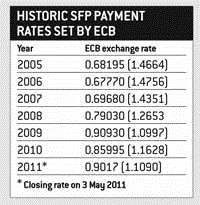Hedging currency to protect value of SFP

The six years since the introduction of the single farm payment have seen the euro value at which it is paid fluctuate by more than 25%. At the time of writing, the euro reached a 56-week high at more than 90p.
This exposes claimants to an equally volatile SFP income. At the worst exchange rate at which SFP has been paid (see table), a 100,000 euro payment would have been worth £67,770 while the best rate would have paid almost £91,000.
That risk can be reduced by hedging, which allows an exchange rate to be booked on the currency markets.
 Most SFP claimants take their payment in sterling. For these, the most common hedging method is to book a forward contract known as a contract for difference which obliges them to sell euros for sterling at a pre-agreed rate on a specific date, usually on 30 September when the SFP rate is set. These are sometimes carried out on 1 October.
Most SFP claimants take their payment in sterling. For these, the most common hedging method is to book a forward contract known as a contract for difference which obliges them to sell euros for sterling at a pre-agreed rate on a specific date, usually on 30 September when the SFP rate is set. These are sometimes carried out on 1 October.
“These transactions will be executed by a bank or broker which will close out the trade for you. As you will have no euros to sell, the bank or broker will effect an equal and opposite contract at the spot rate on the chosen date,” explains Ben Wilkinson of accountant Chavereys.
“Depending on market movements, you will realise either a profit which will make up for any disadvantage after the SFP rate setting or a loss to set against an advantage you will have after the SFP rate setting.”
The forward-booked exchange rate and the actual SFP exchange rate should offset each other so that the net financial result achieves the pre-agreed rate with the bank or broker.
Claimants who receive sterling SFP can hedge its value any time before 30 September each year. The European Central Bank exchange rate on this date is used to set the rate at which SFP is paid in sterling. Those who receive SFP in euro can hedge at any time before their SFP payment is made to them.
Mr Wilkinson cautions that claimants considering hedging need to think carefully about the likely euro value of their SFP, taking into account modulation and any other deductions so that the amount hedged can be as closely aligned as possible to the final euro payment.
For those who select to have SFP paid in euro, the most common approach is to use a flexible forward contract to fix the exchange rate within a certain timescale. “The flexibility of this is extremely important, you don’t want to have to worry about receiving your SFP within a certain timescale,” says Tom Barclay of currency broker WorldFirst.
“Seventy percent of clients have their own euro account but for those who don’t, their euros are paid into our SFP euro account and we transfer the value of their SFP in sterling to their individual sterling bank accounts on the same day.”
Habits have changed, says Mr Barclay. Two years ago, farmers generally wanted to hedge or fix 100% of the value of their SFP. “Now we have greater volatility, more are choosing to hedge in tranches.
“The point of hedging is risk management, not trying to second guess what the market will do,” he says. “Currency management should be a regular item on the farm management agenda.
“We make our money on the spread between the interbank (market) rate of exchange for the currency and the rate we offer to customers, which is always within 1% of the interbank rate, no matter what the size of the transaction.”
He advises checking brokers’ credit ratings, especially if euro SFP payments are to go into the broker’s euro account.
Apart from forward contracts, there are several other ways farmers can protect their SFP, including currency options which protect from adverse rate movements but also allow them to benefit if the rate improves. However, options require more detailed knowledge and management than fixed forward contracts.
Forward contracts require a deposit of up to 15% of the value of the transaction but where banks hold security over a farming business, deposits are not always required.
A participating forward is a type of option that requires a reduced deposit and allows participants to benefit from 50% of any favourable exchange rate movement.
Hedging questions
* Are you getting a good rate – how far is it from the interbank rate?
* Are costs catered for by rate offered or separate fees or premiums?
* How flexible is your contract?Are there penalties?
* Is a deposit required – is it competitive?
* What happens if you do not receive SFP by expected date? Some contracts allow for bringing forward or rolling on but check cost of this – others will be closed out automatically
